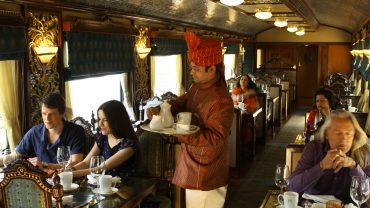Bhutan is a Buddhist kingdom situated on the Himalayas’ eastern edge. The kingdom is famous for its monasteries, fortresses, and its breathtaking landscapes. Until recently, Bhutan remained tucked away from the rest of the world, making it a very difficult place to visit. Unsurprisingly, facts about Bhutan have proved meager and elusive.
The kingdom has deliberately shut itself off to retain its traditions and culture intact. Tourists visiting this country must pay an exorbitant price since the country is intent on deterring the travelers from eroding their way of life.
- Land of the Thunder Dragon
The Bhutanese call their land Druk Yul, the Land of the Thunder Dragon, because of the storms that often pass over Bhutan from the Himalayas. The Druk, a Thunder Dragon, is the national symbol of Bhutan. It is depicted holding jewels on Bhutan’s national flag. Meanwhile, they identify themselves as Drukpa, dragon people, and their king as Druk Gyalpo, dragon king.
- It’s the only country that measures its prosperity by how happy people are
Bhutan is unique in measuring its economic prosperity not by how wealthy its people are, but by how happy they are. Their official equivalent of our ‘Gross Domestic Product’ or ‘GDP’ is ‘Gross Domestic Happiness’. Introduced by former king, this choice of indicator reflects the values of the Bhutanese: happiness and contentment should come first.
- A Capital City with no traffic lights!
It seems inconceivable that a busy capital city could function without traffic lights, but Bhutan’s capital, Thimphu, manages it – and is the world’s only traffic light-free capital. In place of these ubiquitous traffic controls are men wearing white gloves, who direct the traffic in person using hand signals. Apparently a set of traffic lights were trialled in Thimphu, but they were quickly abandoned after locals complained they they were too impersonal.
- Rice in Bhutan is red
The staple rice in Bhutan isn’t the white rice we’re used to, or even the brown rice loved by health fanatics. It’s red. It has a nuttier flavour than other types of rice, and cooks more quickly, producing a sticky texture and deep pink colour when cooked. It’s an important part of the Bhutanese diet, but it may come as a surprise to the western visitor.
- Smoking, skateboarding and plastic bags are all banned
Quite a few things in Bhutan are banned. It’s officially the only non-smoking country in the world, although plenty of people defy the law when at home or in nightclubs. Plastic bags are, understandably, banned for environmental reasons, but the country’s motives for banning skateboarding are a little harder to discern. Apparently the government decided that they were too dangerous, after a few too many accidents involving skateboarders and cars.
- Everyone appears to have the same birthday in Bhutan
The song “Happy Birthday” may be among the most played songs of all time here in the west, but it’s not such a big hit in Bhutan. That’s because birthdays aren’t celebrated in Bhutan, and most people don’t even know their date of birth or how old they are. For administrative purposes, therefore, Bhutan’s citizens have the same birthday: 1 January. So, if you’re planning a birthday trip to Bhutan, don’t expect them to sing Happy Birthday to you – just enjoy the fact that you’ll be in a country that genuinely believes that leading a happy life is more important than how many years you’ve been on the planet for.
- Phalluses symbolises good luck and fertility in Bhutan.
The Bhutanese value fertility. It is not uncommon to see phalluses painted on walls and carved into wood or buildings — these are believed to bring good luck and fortune.the ubiquitous phallus! Known for his crazy ways of enlightening others, legend has it that he subdued evil spirits and turned them into protective deities by hitting them with his erect member, which by the way is also referred to as “Thunderbolt of Flaming Wisdom”. He is known as the fertility saint and the site blessed by him is home to the famous Temple of Fertility, Chimi Lakhang.
- Bhutanese manners require you to refuse food whenever it’s offered to you. The tradition is to say the words “meshu meshu”and cover your mouth with your hands. You can give in, though, after two or three offers.
Bhutanese etiquette requires you to refuse food when it is offered to you. The tradition is to say, “meshu, meshu”, covering your mouth with your hands while politely declining the food. Your host will not take the issue seriously and will continue to offer you the refreshments. You can give in on the second or third offer.
- Paro Airport is the only international airport of Bhutan. Surrounded by the towering peaks of the Himalayas, Paro is one of the world’s most challenging airports for pilots. In fact, only eight pilots in the world are currently certified to land there.
Paro Airport is the sole international airport of Bhutan. The tiny airport situated among the steep hills of Himalayas. Flying in and out of the airport is considered to be very dangerous. The pilot has to maneuver his plane between numerous sharp peaks of the Himalayan Mountains. He has to avoid the houses situated close to the airport and land on a narrow 6,500-foot runway. A strong gust of wind, which often occurs, can easily send the plane off course. Only eight pilots are qualified to fly in and out of this dangerous airport.
- Gangkhar Puensum, at 24,842 feet, is the highest point in Bhutan. It also is the highest unclimbed mountain in the world.
Gangkhar Puensum is the highest mountain in Bhutan. The mountain is the 40th highest peak in the world. Surprisingly, the mountain has still never been climbed. “Gangkhar Puensum” means “White peak of three spiritual brothers”. The mountain borders Tibet and is a disputed territory. The Chinese maps put the mountain on the border, but other sources show the mountain in Bhutan.








